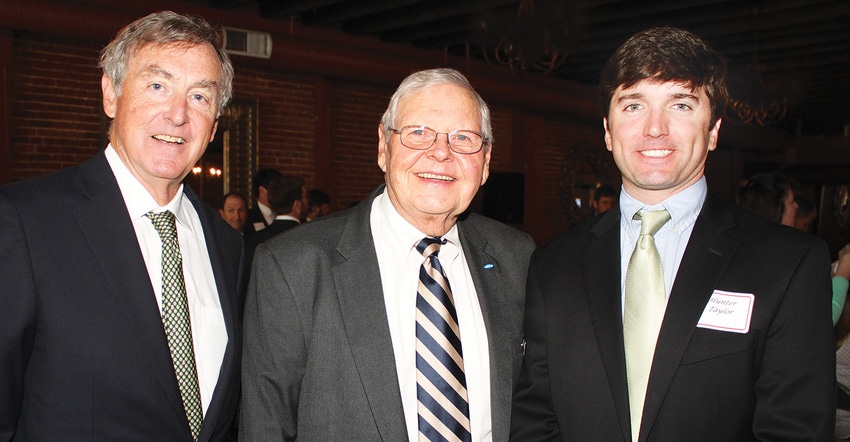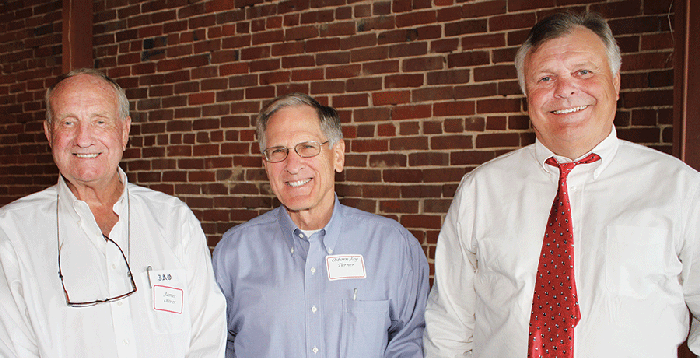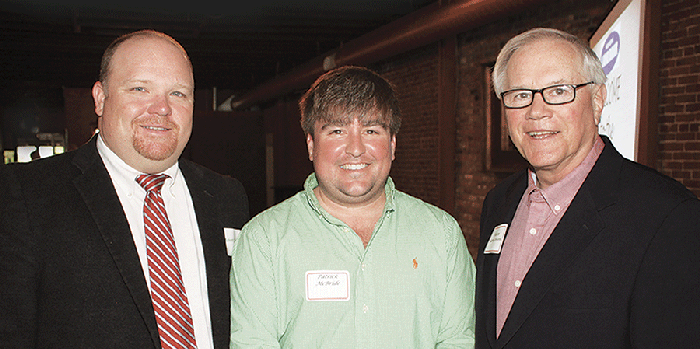
It’s the unexpected that can make forecasting somewhat perilous, says Morgan Gulledge, economist for Mississippi Land Bank, who spoke at the organization’s annual meeting.
“At a planning session last October, we were trying to decide in which direction the economy would go over the coming year or two, and I practically guaranteed that interest rates would not be going up. I based that forecast partially on the general expectation that Donald Trump would not win the election, and that we’d have a continuation of the same fiscal policies we’d had for seven or eight years.
“Was I ever wrong! In the first week or two following Mr. Trump’s win, there was a rally in equities and bonds cratered.” While Gulledge says he had hedged his October forecast with the caveat that “some things are out of our control: demographics, birth rates, the fact that interest rates had been near zero for a long time and wouldn’t turn on a dime,” his predictions “didn’t exactly constitute my my finest moment.
James Oliver, from left, Raymat Crop Science, Hernando, Miss.; Jay Turner, Oxford, Miss., Farm Source Ag LLC, Oxford, Miss.; and Ronnie Sellers, chief credit officer for Mississippi Land Bank at Senatobia, Miss., were among those attending the MLB annual meeting.
“The 10-year Treasury note, which I use as sort of a base rate, went from 1.74 percent to a high of 2.62 percent — an enormous move in such a short time. Yesterday, it had fallen to 2.37, well off the highs, even though the Federal Reserve has raised rates a couple of times since then.
“The 10-year Farm Credit bond had been at about a 60 basis points margin over the Treasury note of the same maturity, and that has started to grow a bit. Back in October, the 10-year Farm Credit bond was yielding 2.19 percent; it’s at 3.49 percent now — up 130 basis points. I also priced high grade corporate bonds. A General Electric bond was at 2.20 percent last October; it’s now at 4.16, up nearly 200 basis points.
“So, we’ve seen quite a runup in rates, and I think the industry bias is that interest rates will continue to rise — and they need to; zero rates are not good for any of us.”
NATIONALISM VS. GLOBALISM
Back in October, Gulledge says, “there was $10 trillion to $11 trillion in the world that was priced at zero or a negative interest rate, which had never happened before. U.S. interest rates still look stellar compared to the rest of the world. Yesterday, the 10-year bond for Germany was at 0.22 percent; France was 0.88 percent; and the U.K., 1.07 percent. There have been some significant problems in the economies of western Europe. Our rates have been rising, and that’s a good thing. The goal is for them to increase slowly over time, rather than in a steady line.
Another challenge, he says, is nationalism versus globalism. “The U.S. has decided globalism is something we’re not happy with. But globalism has been good for agriculture — we’ve enjoyed selling our farm products around the world.” Nationalism, coupled with a strong dollar, further compounds the challenge, Gulledge says. “Back in December, the dollar was at a 14-year high. That’s not good for our farm trade.”
Attending the annual meeting of the Mississippi Land Bank were, from left, Rob Taylor, Mississippi Land Bank, Cleveland, Miss.; Patrick McBride, Tom Smith Land and Homes, Como, Miss.; and Garth Lovvorn, producer, Batesville, Miss.
He referred to a March 20 Wall Street Journal article on global trade. “It was two full pages, with charts and graphs galore. But two things stood out for me. One was about container ships, those vessels with huge containers stacked four to five high, that carry goods between countries around the world. The article noted that 862 of those huge ships were being cut up and turned to scrap because there’s no demand for them. The owners can’t find anything to haul.”
The other item of interest, Gulledge says, was about General Electric, which makes thousands of products, from light bulbs to jet engines to sophisticated medical equipment. “GE also produces railroad locomotives. They were being made in the northeast U.S. and shipped around the world. But to defeat some of the trade barriers they face, GE is now going to build those locomotives in India — which isn’t good for the workers who were building them here in the U.S.”
As an additional example of how world trade is changing, he cites the Chinese project referred to as The New Silk Road, a rail system that traverses part of the ancient trade route, and links Beijing with London. The almost 7,500 mile journey takes about 18 days, but it offers manufacturers another option in between ocean shipping, which can take up to a month, and air shipments, which are very expensive.
TECHNOLOGICAL CHANGES
The pace of technological change continues to amaze, Gulledge says. "It’s present everywhere. It has particularly made a big impact in energy; it’s a key reason why, yesterday, West Texas intermediate crude oil was $52 per barrel and natural gas was $3.25 per Mcf (1,000 cubic feet). There’s no upside in energy prices today. Our son is a helicopter pilot in the Gulf of Mexico. His company has just laid off 200 people and closed operations all across the coast of Louisiana.”
The digital revolution has also had a major impact on lives worldwide, he says. “Yesterday. AT&T bought a very small company for $5 billion that will let you run everything in your house from your cell phone or other mobile device. It’s part of the Internet of Things. Aerial drones have become big in agriculture and other businesses. Self-driving cars and trucks are in development, and you’ll soon be able to operate your tractor or combine from a laptop in your pickup or your office.”
Although agriculture faces many challenges, some of them daunting, Gulledge sees parallels with Prime Minister Winston Churchill’s address to the British nation in May 1940. “Facing possible annihilation, his approach to meeting challenges is relevant today. First, he defined the problem — as we try to do today in helping our customers. He said, ‘Victory is our only option,’ which is what farmers struggle for every day. ‘Our cause is just,’ he declared. Mississippi agriculture and American agriculture are just causes — we work hard for our causes. Churchill concluded by saying, ‘Together, we will win.’
“That’s our ultimate goal. We face a lot of challenges. But together, we will be successful. We will do what agriculture has always done: We will innovate, we will adapt, we will overcome the challenges before us. We’ve done it in every generation, every year.
Nothing is more important than agriculture’s continued prosperity. We’ve worked hard for it; we will not be cowed by the challenges that are before us.”
About the Author(s)
You May Also Like




